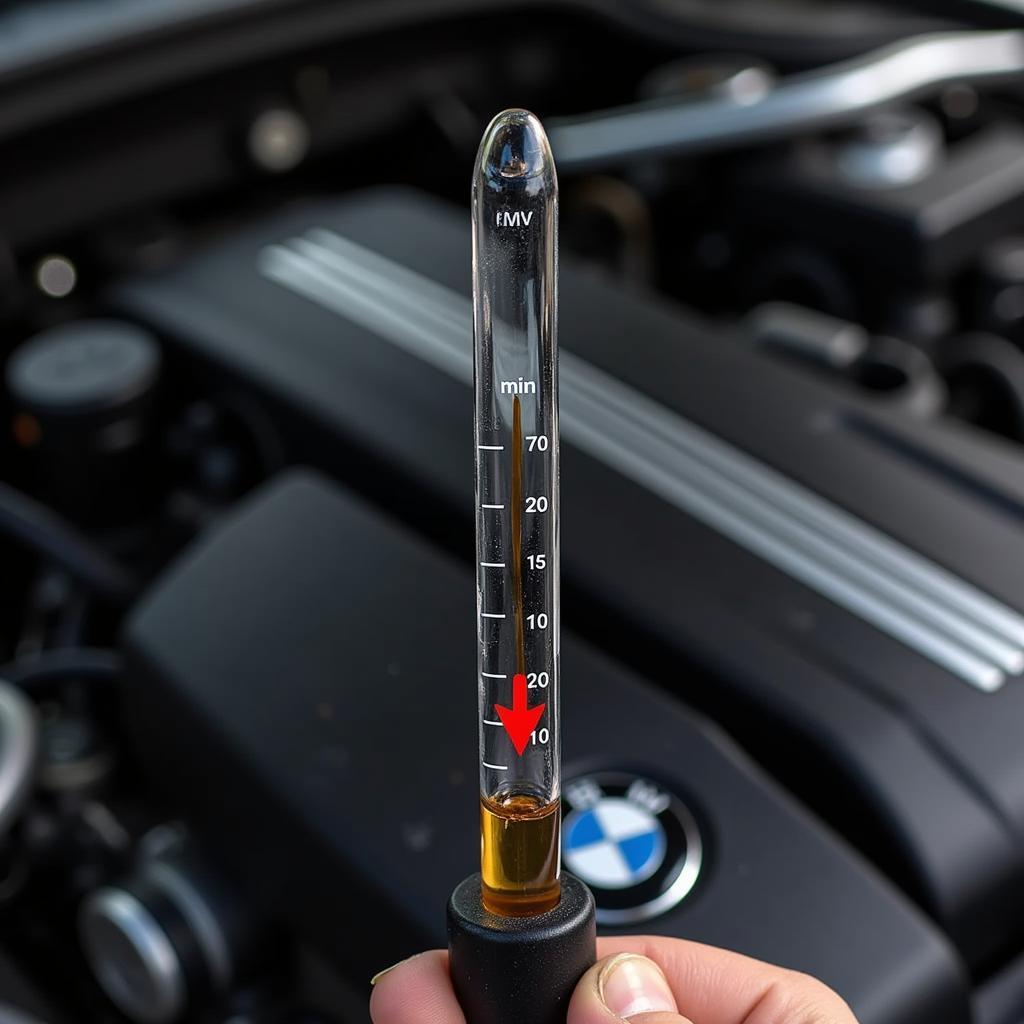If you’re hearing a ticking sound from your BMW, you’re likely concerned. That ticking sound can be anything from a minor annoyance to a sign of a serious problem. This article will cover the most common reasons why your BMW might be making a ticking sound, helping you diagnose the issue and find the right solution.
Common Causes of Ticking Sounds in BMWs
There are several reasons why your BMW might be making a ticking sound. These range from simple fixes to more complex mechanical issues. Identifying the source of the ticking is the first step towards a solution. Here’s a breakdown of the usual suspects:
-
Low Oil Level: One of the most common causes of ticking is low engine oil. Insufficient oil can lead to inadequate lubrication of the engine components, causing metal-on-metal contact and that characteristic ticking sound. Check your oil level regularly and top it off if necessary.
-
Faulty Valvetrain Components: The valvetrain, which includes parts like lifters, rockers, and valves, is another common culprit. Worn or damaged components can create a ticking sound as they struggle to function properly. This is often more noticeable when the engine is cold and lessens as it warms up.
-
Exhaust Leaks: A ticking sound, especially when accelerating, can indicate an exhaust leak. This is often caused by a crack or hole in the exhaust manifold or other exhaust system components.
-
Fuel Injectors: The fuel injectors deliver fuel to the engine cylinders. A faulty or clogged injector can produce a ticking or clicking noise.
-
Timing Chain Issues: BMWs are known for timing chain issues, especially in certain models. A stretched or worn timing chain can create a ticking or rattling sound, often accompanied by poor engine performance.
 BMW Ticking Sound – Low Oil
BMW Ticking Sound – Low Oil
Diagnosing the Ticking Sound
Pinpointing the exact cause of the ticking requires some investigative work. Here’s a step-by-step guide to help you:
-
Listen Carefully: Try to determine where the ticking sound is coming from. Is it from the top, bottom, front, or back of the engine? Does it change with engine speed or temperature?
-
Check the Oil: This is the easiest and often the most effective first step. Ensure the engine is off and on level ground. Remove the dipstick, wipe it clean, reinsert it fully, and then remove it again to check the oil level.
-
Inspect the Exhaust System: Look for any visible signs of damage, like cracks or holes, in the exhaust manifold, pipes, or muffler. 2008 bmw m3 exhaust sound might provide you with some examples of healthy exhaust sounds.
-
Consult a Professional: If you’re unable to pinpoint the cause yourself, it’s best to consult a qualified BMW technician. They have the tools and expertise to diagnose the problem accurately.
What if the Ticking Sound is from the Valvetrain?
If you suspect the valvetrain is the culprit, it’s crucial to address the issue promptly. Ignoring it can lead to more severe engine damage. Replacing worn lifters, rockers, or other valvetrain components often resolves the problem. This is a complex repair that’s best left to a professional.
bmw 3 sd card audio is a completely different topic, but it demonstrates the breadth of technical issues we cover on CARDIAGTECH.
Preventing Ticking Sounds in Your BMW
Regular maintenance is key to preventing ticking sounds and other engine problems. Here are some preventative measures:
- Regular Oil Changes: Follow the recommended oil change intervals specified in your BMW’s owner’s manual.
- Use High-Quality Oil: Use the correct oil type and viscosity recommended by BMW.
- Regular Inspections: Have your BMW inspected by a qualified technician at least annually.
2009 bmw 335xi bad rotor sound highlights another common issue, further demonstrating our commitment to comprehensive BMW diagnostics.
Conclusion
A ticking sound in your BMW can be concerning, but it’s not always a sign of a catastrophic problem. By understanding the potential causes and taking appropriate steps to diagnose and address the issue, you can keep your BMW running smoothly. Regular maintenance is the best way to prevent these issues in the future. So, if you hear that ticking sound, don’t ignore it. Address it promptly and avoid potential costly repairs down the line.
bmw e30 325i sound might offer some comparative insights if you’re dealing with an older model.
FAQ
- What is the most common cause of a ticking sound in a BMW? Low oil is often the culprit.
- Should I drive my BMW if it’s making a ticking sound? It depends on the severity. If the ticking is loud or accompanied by other symptoms, it’s best not to drive it.
- How much does it cost to fix a ticking sound in a BMW? The cost varies depending on the cause and the necessary repairs.
- Can a ticking sound be a sign of serious engine damage? Yes, especially if ignored.
- How can I prevent ticking sounds in my BMW? Regular maintenance, including oil changes and inspections, is crucial.
- What if the ticking is coming from the exhaust? An exhaust leak is likely. Have the exhaust system inspected and repaired.
- Is it safe to diagnose the ticking sound myself? While you can perform some basic checks, it’s always best to consult a professional for an accurate diagnosis.
2006 bmw m3 sound can also be a helpful resource for identifying different engine sounds.
For further assistance, please contact us via Whatsapp: +1 (641) 206-8880, Email: CARDIAGTECH[email protected] or visit our workshop at 276 Reock St, City of Orange, NJ 07050, United States. We have a 24/7 customer support team ready to assist you.
